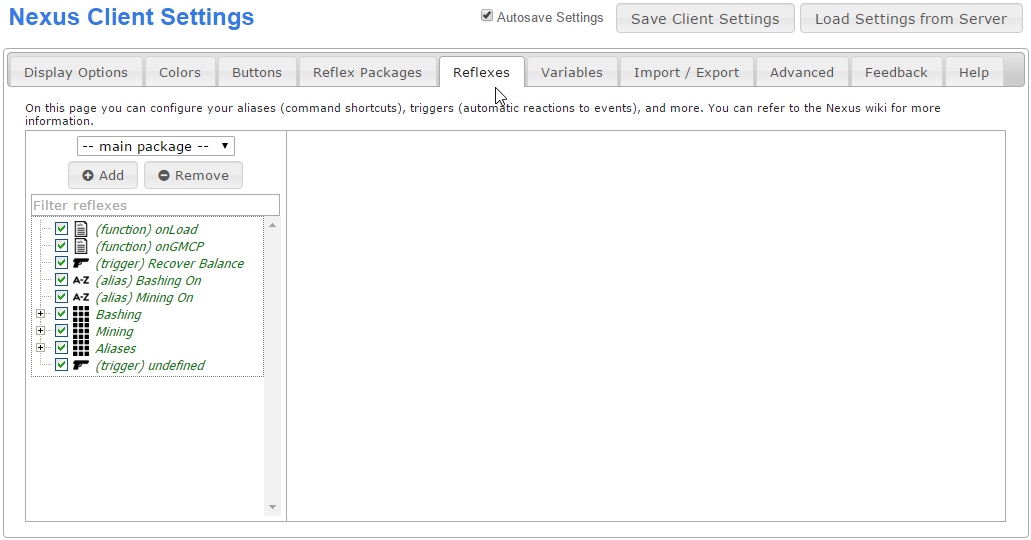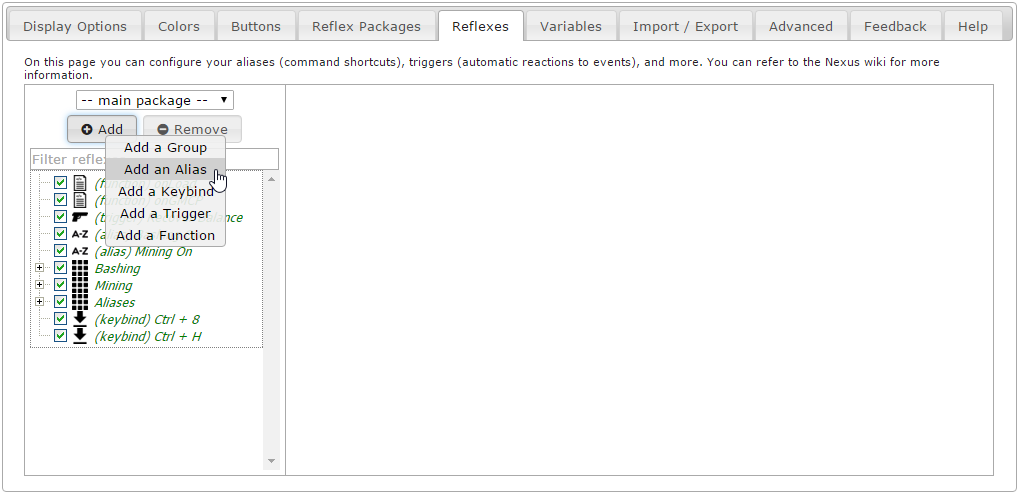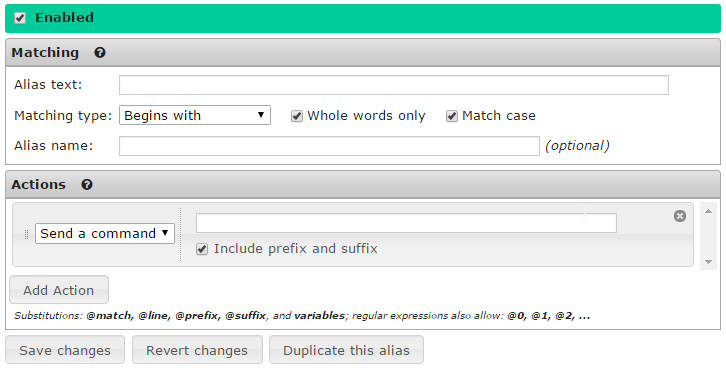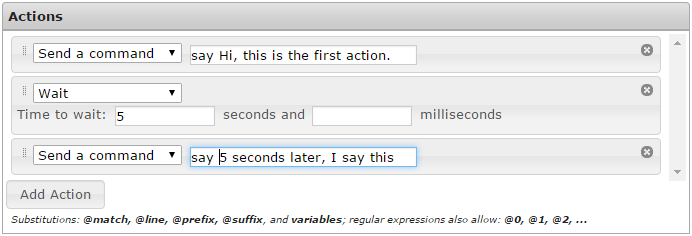Aliases
From Iron Realms Nexus Client Documentation
How to Create a New Alias
Aliases are shortcuts you can create for more complicated commands in the game. Aliases are commonly used for combat. For example I may create an alias that will send the command 'consecrate ground with holysymbol' by just typing in 'cg'.
On this page we will demonstrate how to create a new alias.
Step 1. Open the settings page and click the 'Reflexes' tab.
Reflexes is a term for all of the settings used to automate the game experience. In order to create a new alias you must first click on the 'Reflexes' tab as shown in the image below.
Step 2. Click the 'Add' Button and select 'Add an Alias'.
There are several different reflexes you can create. We want to create an alias. In order to do this, click the 'Add' button located in the left pane and then click on 'Add an Alias'. This will create a new, undefined alias.
Step 3. Options for Aliases.
There are two parts to an alias; Matching and Actions.
Matching is based on what you type into the game. Usually this is a shorter version of a longer command. For example I may use 'arl' for 'apply restoration to legs'.
Actions are what happens when the command is entered into the game. In the example above, 'apply restoration to legs' would be sent to the game when you type in 'arl'.
Matching Options
Matching is used for creating the command for the alias you are creating. There are five settings.
Alias Text
This field is required and contains the alias text. Anything can be used to create your alias. Typically they are very short and easy to remember. for example I may use the text 'sh' and later create an action that will do 'say hello world!'.
This works hand in hand with the 'Matching Type' option. See below.
Whole Words Only
If checked, the alias will only match whole words.
For example, my alias text is 'sh'
In this case, if I type in 'sha' it will NOT match. However, 'sh a' WILL work.
If I uncheck 'Whole words only', then 'sha' will work.
In almost all cases you will just want to keep 'Whole words only' checked. Remember that whole words are separated by spaces and punctuation is considered part of a word.
Case Sensitive
If checked, capitalization must match.
For example, if checked, 'sh' is not the same as 'SH'.
If unchecked, the example above will work.
Alias Name
(Optional) The name of the alias. The name is an identifier that will show up in your list of reflexes. It is not required for your alias and has nothing to do with the actual operation of the alias.
Matching Type
There are three options for matching text.
- Begins with: Will only match an alias that starts with your alias text in it.
- Exact match: Will only match an alias that matches exactly like your alias text.
- Regular expression: This will match any regular expression patterns. This is advanced, but good to learn. See the examples below.
In most cases you will want to use 'Begins with' unless you have more complicated situations.
Action Options
Once you have matched a command, you will want to send an action back.
There are eight different action options.
Send a command
This is the most basic and commonly used action. The alias will send the text to the game.
Show a notice
The action will display text using the set colors. It does not actually send any commands to the game.
Wait
The wait action is usually used in conjunction with other actions. In the example below, we wait 3 seconds and then attack the rat.
Call function
Functions are created with javascript and then called when the alias is typed into the game. You can read more about functions here: Functions.
Execute Script
Scripts are just like functions, but you write them in the box provided. You can read more about writing scripts and functions here: Functions.
Expansions
Aliases support expansions, which allow you to parametrize the commands that are being sent. For example, let's say you want to make an alias that picks up an item and puts it into your pack, called pp. To do this, you can simply make an alias with pp as the alias text, and two actions (use Add Action to add the second one), get @suffix and put @suffix in pack. For both actions, disable the include prefix and suffix option, and you are done. See Put Pack Alias.
The available expansions are:
- @match - the matched text
- @suffix - anything coming after the matched text
- @prefix - anything coming in front of the matched text; this only makes sense for regular expressions
Tip: You can use @line to send the original command along with the aliased commands - this is useful if you want to perform additional actions when sending a particular command, instead of replacing it.
Here is more information about expansions.
Examples
- Hello World Alias: A simple example of an alias.
- Basic Targeting Alias: These aliases use variables to target and attack mobiles.
- Put Pack Alias: This alias quickly gets and puts items in packs using the @suffix expansion.
- Disable Group Alias: This is an example alias that will disable an entire group or reflexes.






